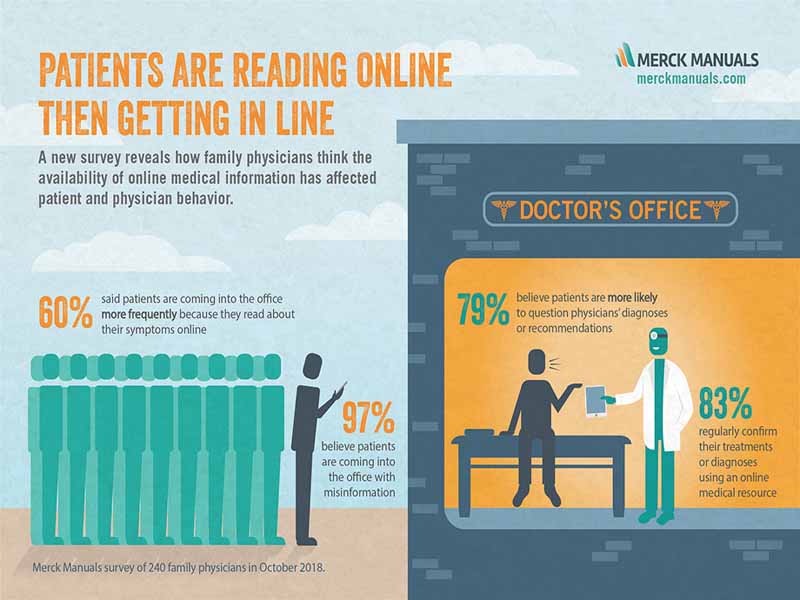Survey Weighs Effects of Patient Access to Health Info Online
'Dr. Google' Has Changed How FPs Practice, Interact with Patients
December 05, 2018 10:25 am Michael Devitt – Twenty years ago, obtaining the latest information on health and well-being meant a trip to the library or the family physician's office for most people. But today, finding up-to-date health information can be as easy as tapping on a smartphone or clicking a mouse.
Having greater access to health information online has affected much more than how people take care of themselves. The results of a survey of family physicians conducted during the AAFP Family Medicine Experience in New Orleans in October show that easy access has substantially changed the ways FPs practice and communicate with patients.
"Our survey uncovered an interesting dynamic at play," said Robert Porter, M.D., editor-in-chief of the Merck Manuals, which conducted the survey, in a news release.(www.prnewswire.com) "While the ease and availability of online medical information instills confidence in family physicians, they believe 'Dr. Google' has the potential to introduce anxiety among patients."
Survey Details and Highlights
In the survey, family physicians answered seven questions on the increased availability of medical information online and its effects on patient and physician behaviors. A total of 240 family physicians who attended the conference completed the survey.
Story Highlights
Results of a survey conducted during this year's Family Medicine Experience illustrate the effects of patients' access to online health information on the physician-patient relationship.
Of the 240 family physicians who took the survey, 97 percent reported that a patient presented to their office with misinformation from an online source.
The AAFP and other organizations have published guides that help patients find and evaluate online health sources for reliability.
Survey results revealed some positive aspects to patients' increased access to information. Sixty-four percent of FPs thought the expanded availability of medical information made patients more fluent in medical topics. Also, 60 percent of FPs thought the frequency of patient visits rose because a patient had read about a symptom or treatment online.
But that enhanced access also produced some unexpected outcomes. Although 82 percent of FPs thought that patients contacted their office or a nurse's line with a medical question more frequently than in previous years, 12 percent of FPs thought that patients contacted their office less frequently, and 29 percent thought that increased access to information had caused a decrease in the frequency of patient visits in recent years.
FPs also stated overwhelmingly that access to more information did not equal access to better information. Ninety-seven percent of FPs who took the survey reported that patients presented to their office with false or inaccurate information at some point.
In another point of concern, 79 percent of FPs thought the increased availability of medical information online made patients more likely to question their diagnosis or recommendation.
"In some ways, it's made appointments more complicated," one physician commented. "Patients search their symptoms online and see the worst-case scenarios, rather than the most common scenarios, so they come into appointments with more anxiety."
As a result, FPs often found themselves having to separate fact from fiction and steer patients in the right direction to get the most reliable information.

"We run into problems when patients go to online sources that aren't evidence-based medicine," explained another physician. "But patients aren't going to stop looking up their symptoms on the internet, so it's up to physicians to direct them to trusted sources."
A high percentage of FPs also reported using online sources in their own practices. Eighty-three percent of the FPs who took the survey said they regularly confirm a treatment or diagnosis using an online medical resource. Another 89 percent said that having regular access to medical information online made them more confident when interacting with patients.
Finding Reliable Sources: The Bottom Line
Anyone who uses the internet knows there's an enormous amount of health information online -- much of it false or misleading. But figuring out which sources are reliable is actually not that difficult. The AAFP,(familydoctor.org) the National Library of Medicine(medlineplus.gov) and other agencies have all published guides that offer tips for finding and evaluating online health resources for reliability.
When talking about health, it's important that both family physicians and their patients use trustworthy sources. That's key to ensuring that physicians and their patients are on the same page when discussing care options, according to Jen Frost, M.D., medical director for the AAFP Division of Health of the Public and Science.
"The increased access to online health information has the potential to increase a patient's engagement in and understanding of their care," Frost told AAFP News. "But misinformation can make patient care more difficult and has the potential to cause harm.
"Familydoctor.org(familydoctor.org) presents accurate patient-facing material on topics relevant to family medicine."
